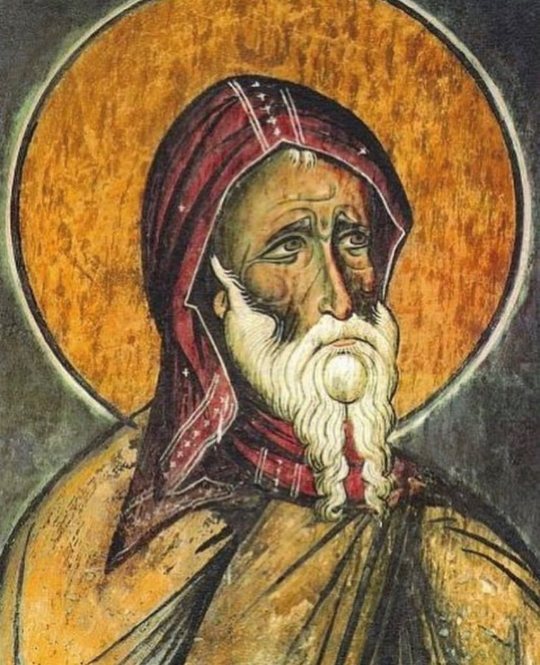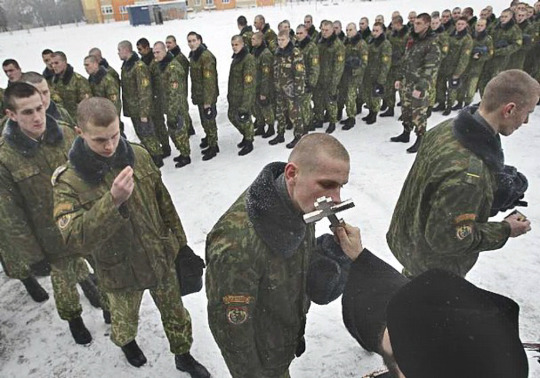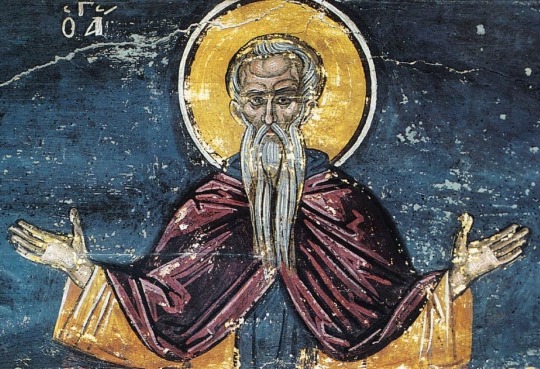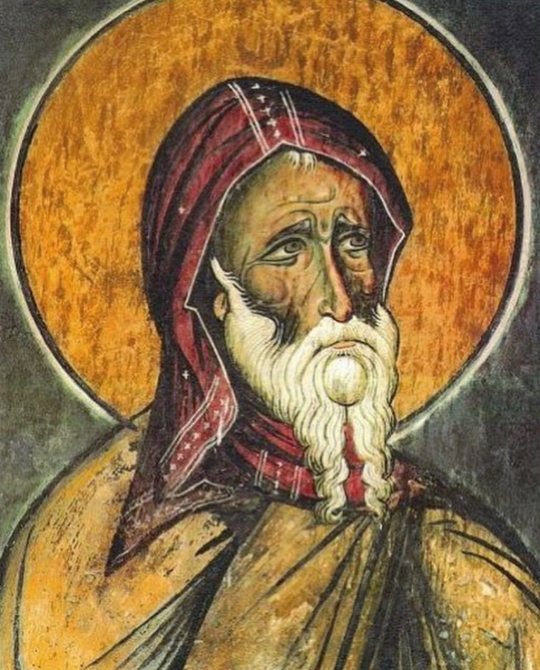#abba poemen
Text
Some old men came to Abba Poemen and said to him, “When we see brothers who are dozing at the synaxis (services), shall we rouse them so they will be watchful?” He said to them, “For my part when I see a brother dozing, I put his head on my knees and let him rest.”
Sayings of the Desert Fathers

11 notes
·
View notes
Text
It was said of him that he had a hollow in his chest channelled out by the tears which fell from his eyes all his life while he sat at his manual work. When Abba Poemen learned that he was dead, he said weeping, 'Truly you are blessed, Abba Arsenius, for you wept for yourself in this world! He who does not weep for himself here
below will weep eternally hereafter; so it is impossible not to weep, either voluntarily or when compelled through suffering.'
Sayings of the Desert Fathers
1 note
·
View note
Photo

Today we also celebrate the Venerable Poemen the Great. Saint Poemen was an Egyptian by birth and a great ascetic of Egypt. As a boy he visited the most renewed spiritual men. He gathered tangible knowledge from them, as a bee gathers honey from flowers. Poemen once begged the elder Paul to take him to St. Paisius. Seeing Poemen, Paisius said to Paul: “This child will save many; the hand of God is on him.” In time Poemen was tonsured a monk, and attracted two of his brothers to the monastic life as well. Once his mother came to see her sons. Poemen did not allow her to enter but asked her through the door: “Do you desire more to see us here, or there, in eternity?” The mother withdrew with joy, saying: “Since I will surely see you there, then I do not desire to see you here!” In the monastery where these three brothers dwelled (which was governed by Abba Anoub, Poemen’s eldest brother), their rule was as follows: At night they spent four hours doing manual work, four hours sleeping, and four hours reading the Psalter. During the day, they alternated work and prayer from morning to noon, did their reading from noon until Vespers, and made supper for themselves after Vespers. This was the only meal in twenty-four hours, and it usually consisted of some kind of cabbage. Poemen is said to have commented: “We ate that which was given to us. No one ever said, ‘Give me something else,’ or ‘I do not want that.’ In this way, we spent our entire life in silence and peace.” Poemen lived a life of asceticism in the fifth century, and reposed peacefully in old age. May he intercede for us always + Source: https://www.gometropolis.org/orthodox-faith/feast-days/venerable-poemen-the-great/ (at Wadi El Natrun - El Alamein Rest) https://www.instagram.com/p/ChvN1aJvGUG/?igshid=NGJjMDIxMWI=
17 notes
·
View notes
Quote
Vigilance, self-knowledge, and discernment; these are the guides of the soul.
Abba Poemen
#Favorite Saint Quotes AJD#The Desert Fathers AJD#Iustitiam Tuam amo.#Xiangxou Yu OSJ#LGAJDXYOSJOL#Self-Accusation AJD#Know Thyself AJD#JL AJD#STG AJD#MLG AJD#Stay Humble AJD#Be Vigilant AJD#Love Everyone AJD#Final Perseverance AJD#PCH AJD#HHH AJD#PWSPsTVB AJD#Resilient S.T.A.M.P.S. AJD#Do not be improvident.#Fun And Formed AJD#Remember AJD
0 notes
Text
Humility
Abba John the Dwarf asked his monks: “Who sold Joseph?” One monk replied: “His brothers.” To this the elder replied: “Not his brothers, but his humility. Joseph could have said that he was their brother and protested his being sold, but he remained silent. His humility, therefore, sold him. Afterward, this same humility made him master over Egypt.” We defend ourselves too much from the external difficulties that come from surrendering ourselves to the will of God. That is why we lose the good fruits that are harvested at the end of difficulties endured with humility. Abba Poemen wisely said: “We have abandoned the easy yoke, that is, self-reproach; and we have burdened ourselves with a heavy yoke, that is, self-justification.” The Christian accepts every difficulty as payment for present or past sins, seeking in all the will of God with faith and awaiting the end with hope.
— Saint Nikolai Velimirović, The Prologue of Ohrid, May 3
0 notes
Text
A brother came to Abba Poemen and said to him, “I have many sinful temptations and am in danger from them.” The elder took him out in to the open air and said to him, “Inflate your chest and hold the winds,” but he said, “I cannot do that.” The elder said to him, “If you cannot do that, neither can you prevent sinful temptations from coming in. Your task is to withstand them.”
Desert Fathers Wisdom, from the Monastery of Christ in the Desert
#monastery of christ in the desert#desert fathers#abba poemen#temptation#this is a vital distinction#the struggle against sin#monasticism
6 notes
·
View notes
Photo

5 notes
·
View notes
Quote
A hypocrite is one who teaches his neighbor something to which he has not attained himself.
Abba Poemen
49 notes
·
View notes
Quote
Teach thy heart to keep that which thy tongue teacheth
St. Poemen
#orthodoxthoughts#orthodox#orthodoxy#eastern orthodox#orthodox christian#christian#Christianity#Jesus Christ#ICXC#quote#orthodox quote#The Paradise of the Holy Fathers#The Lausiac History#Abba Poemen#St. Poemen#June 16
56 notes
·
View notes
Text
The broader political implications of this truth were not lost on the authorities in the early years of the Christian empire. The desert monks, unlike others in society, were free to love at great risk. It was no wonder that prelates and emperors continually sought to curry the favor of these desert athletes, recognizing the intense political danger of a people who had nothing whatever to lose. The apophthegmata of the desert Christians are filled with references to magistrates and their difficulties in dealing with the freedom of the desert ascetics. These were a people who, having chosen to live in the wilds, wanted nothing; hence they could not be coopted or threatened. Having metaphorically died to the world and all its seductions, they were far less subject to outside pressures of status, power, money, and knowledge.
"They were in a certain sense 'anarchists,' and it will do no harm to think of them in that light. They were men who did not believe in letting themselves be passively guided and ruled by a decadent state, and who believed that there was a way of getting along without . . . dependence on accepted, conventional values."
Abba Poemen refused to bend to a magistrate's will, even when his sister's son was thrown into prison because of his resistance. Abba Ammonathas had to deal with a troubling magistrate who tried to levy an unfair tax upon the brothers of his community. Abba Arsenius sent away a public official who had told him he had inherited a great sum from a recently deceased senator in his family. "I was dead long before this senator," proclaimed Arsenius, and returned the will to him, accepting nothing. The solitary can be a person of deep compassion and justice because he or she cannot be coerced by ordinary systems of power.
Belden C. Lane, The Solace of Fierce Landscapes: Exploring Desert and Mountain Spirituality
18 notes
·
View notes
Text
“There is no greater love than that a man lays down his life for his neighbor. When you hear someone complaining and you struggle with yourself and do not answer him back with complaints; when you are hurt and bear it patiently, not looking for revenge; then you are laying down your life for your neighbor.” - Abba Poemen (Sayings of the Desert Fathers)
6 notes
·
View notes
Text

Un frère interrogea abba Poemen, disant : « Des frères habitent avec moi. Veux-tu que je leur commande? » Le vieillard lui dit : « Non, mais fais d'abord le travail et, s'ils veulent subsister, ils s'occuperont d'eux-mêmes. » Le frère lui dit « Mais ce sont eux-mêmes, Père, qui désirent que je leur commande » Le vieillard lui dit « Non, mais deviens leur modèle, non leur législateur. »
Apophtegmes, Poemen, 188
3 notes
·
View notes
Text

"There is no greater love than that a man lays down his life for his neighbor. When you hear someone complaining and you struggle with yourself and do not answer him back with complaints; when you are hurt and bear it patiently, not looking for revenge; then you are laying down your life for your neighbor."
Abba Poemen
25 notes
·
View notes
Photo

Today we also celebrate the Venerable Poemen the Great. Saint Poemen was an Egyptian by birth and a great ascetic of Egypt. As a boy he visited the most renewed spiritual men. He gathered tangible knowledge from them, as a bee gathers honey from flowers. Poemen once begged the elder Paul to take him to St. Paisius. Seeing Poemen, Paisius said to Paul: “This child will save many; the hand of God is on him.” In time Poemen was tonsured a monk, and attracted two of his brothers to the monastic life as well. Once his mother came to see her sons. Poemen did not allow her to enter but asked her through the door: “Do you desire more to see us here, or there, in eternity?” The mother withdrew with joy, saying: “Since I will surely see you there, then I do not desire to see you here!” In the monastery where these three brothers dwelled (which was governed by Abba Anoub, Poemen’s eldest brother), their rule was as follows: At night they spent four hours doing manual work, four hours sleeping, and four hours reading the Psalter. During the day, they alternated work and prayer from morning to noon, did their reading from noon until Vespers, and made supper for themselves after Vespers. This was the only meal in twenty-four hours, and it usually consisted of some kind of cabbage. Poemen is said to have commented: “We ate that which was given to us. No one ever said, ‘Give me something else,’ or ‘I do not want that.’ In this way, we spent our entire life in silence and peace.” Poemen lived a life of asceticism in the fifth century, and reposed peacefully in old age. May he intercede for us always + Source: https://www.gometropolis.org/orthodox-faith/feast-days/venerable-poemen-the-great/ (at Wadi El Natroun) https://www.instagram.com/p/CTD9sikIrsg/?utm_medium=tumblr
15 notes
·
View notes
Text

These are the words, which Abba Moses said to Abba Poemen, and the first word, which was spoken by the elder, was: "It is better for a man to put himself to death rather than his neighbor, and he should not condemn him in anything."
- Sayings of the Desert Fathers
5 notes
·
View notes
Quote
Abba Poemen said to Abba Joseph, ‘Tell me how to become a monk.’ He said, ‘If you want to find rest here below all circumstances say, ‘Who am I? and do not judge anyone.’
Sayings of the Desert Fathers
1 note
·
View note